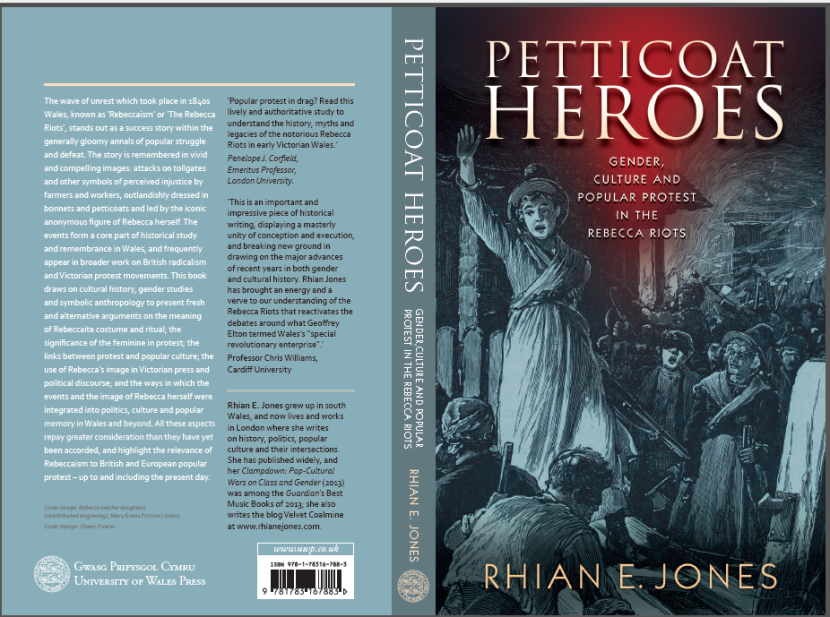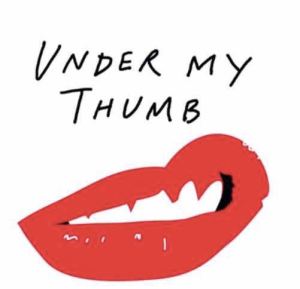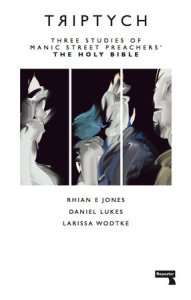Category: Books
Some forthcoming events I’m doing
Variously on music, politics and history – please come along if you’re interested.
Saturday 19th May: @CultishEvents playback of The Holy Bible at which I’ll be giving an introduction to the album and Triptych. Details: https://www.facebook.com/events/1503877846345865/
Saturday 2nd June: talking about music and misogyny in Under My Thumb: Songs That Hate Women and the Women Who Love Them, with the book’s co-editor Eli Davies and our contributors Frances Morgan and Anna Fielding. Details: http://stokenewingtonliteraryfestival.com/snlf_events/under-my-thumb/
Saturday 9th June: I’ll be explaining the early Victorian primitive rebellion known as the Rebecca riots as part of Chartism Day. Details: http://www.ucl.ac.uk/history/history-events-publication/chartism-day
Stuff I’ve done lately.
For New Humanist: The End of Work as We Know It? The gig economy, history, automation, grassroots workers’ organization and other possible responses to late-stage neoliberalism.
For Soundings: Music, Politics and Identity: From Cool Britannia to Grime4Corbyn. Basically Clampdown five years on.
For the Irish Times Women’s Podcast: Under my Thumb‘s co-editor Eli Davies and myself on the complexities of liking misogynist music.
And, for the excellent Desolation Radio, rambling on the Rebecca riots, Chartism, popular protest and radical history.
Under My Thumb: Songs That Hate Women and the Women Who Love Them
Under My Thumb is a collection of women’s music writing, edited by Eli Davies and me, in which contributors discuss being fans of politically dubious music, artists and songs. It’s out in October from Repeater Books and available to pre-order now.
Artists covered, in-depth or in passing, include: Dion and the Belmonts, Frankie Valli and the Four Seasons, Carole King, The Crystals, Phil Spector, Bob Dylan, Pulp, Gary Puckett & the Union Gap, Anni-Frid Lyngstad, The Rolling Stones, Lou Reed, Iggy Pop, David Bowie, Pure Prairie League, Rod Stewart and The Faces, Eddie Cochran, AC/DC, Van Halen, Guns ‘N’ Roses, L7, Elvis Costello, murder ballads, Nick Cave, Sir Mix-a-Lot, Run the Jewels, 2Pac, Eminem, Weezer, The Divine Comedy, Jarvis Cocker, Combichrist, Jay-Z, The Libertines, My Chemical Romance, Fall Out Boy, Kanye West, The-Dream, Swans, Taylor Swift.
Full list of contributors: Amanda Barokh, K. E. Carver, Marissa Chen, Zahra Dalilah, Eli Davies, Judith May Fathallah, Anna Fielding, Alison L. Fraser, Laura Friesen, Beatrice M. Hogg, Rhian E. Jones, Jacey Lamerton, Abi Millar, Emily McQuade, Frances Morgan, Christina Newland, Elizabeth Newton, Stephanie Phillips, Nina Power, Charlotte Lydia Riley, Kelly Robinson, Jude Rogers, Jasmine Hazel Shadrack, Em Smith, Johanna Spiers, Manon Steiner, Fiona Sturges, Rachel Trezise, Larissa Wodtke.
Out now: Triptych, Three Studies of Manic Street Preachers’ The Holy Bible
I can’t get over what – in all applicable senses – a dick move this sort of thing is. Elena Ferrante’s pseudonymity was harming no one, and anon/pseudonymity has historically been an acceptable and sometimes a necessary option for writers – especially for women. The Neapolitan novels have never been presented as strict autobiography. Correct me if I’m wrong, but I can’t think of a pseudonymous male author whose identity has attracted so much intrusive interest edged with a certain sense of pique. The preoccupation with “unmasking” her seems to be tied up with the idea, the demand, that every aspect of a woman must be publicly accessible and available for scrutiny and evaluation. It seems as if her choice to be anonymous was a provocation, for which she’s being punished through public exposure. This as one example of the general overriding of a woman’s stated desires, the insistence that the way she wants to do things can’t be done and must be interrupted, breached, brought back around to the accepted path, is unsettling at the least.
Triptych: Three Studies of Manic Street Preachers’ The Holy Bible is my next book, co-written with Daniel Lukes and Larissa Wodtke, coming out in February next year from Repeater Books.
My bit looks at the politics and pop culture of 90s Britain, growing up in post-industrial Wales, class and gender and the rest of my usual stuff, and how the album fit or didn’t fit into that context.
(Obviously a cultural materialist analysis of the Manics’ least commercial album is the one thing the world needs right now.)

I’ve just finished reading Sylvia Patterson’s book on her life as a music journalist and felt instantly compelled to recommend it. It’s very like Viv Albertine’s memoir, being full of not only the silliness and thrill of being young and loving music, but also casually devastating insight into personal tragedy and cultural shift – and how often the two are combined.
Patterson was never one of my particular favourites growing up (totally unfairly – I think I found her Smash Hits-raised pithy exuberance irritating because I was an insufferably morose teenager, and also I always tribally preferred Melody Maker to NME) but I like her writing a lot more in retrospect and it’s actually clearly been more of an influence on me than I’d realised – her deployment of incisive epithets especially. There’s something distinctly feminine, too, about both her and Albertine’s style of autobiography, and it seems to be specifically an older woman’s thing – this isn’t confessional writing so much as unassuming honesty, a certain understated wisdom and maturity, a settlement with the self that renders obsolete the need to front.
Patterson also captures the death of a particular ideal of music journalism – and of a whole approach to music – that I think people my age may be the last to truly remember. Before the internet as both community and culture/media platform, we were atomised, connected by a music press which was hugely – unimaginably, now – important as a site of cultural discovery, debate and conflict, and for feeling as though you belonged to something bigger, something beyond yourself. This way of thinking and writing about music and culture was formative for me. It was the only thing I saw any sort of sense in or any kind of point to. I grew up wanting to do the same thing, but I grew up into a changed world where the prospect of doing so no longer existed in any stable or secure way. (I mean, I did so regardless; Clampdown is (an attempt at) exactly that kind of writing and I was lucky to find the right publisher for it – indeed, the only imaginable publisher for it.)
There’s been a notable amount of 90s revisionism since that book, as though a particular generation can now see clearly enough at twenty years’ remove to try and weigh up what’s occurred as well as tell their own story. There’s a bit in this book where Patterson recalls her younger self finally recognising the NME’s transformation, round about ’98, into “the indie Heat“, and reading it made me feel, like it was yesterday, that sense of incredulity and personal betrayal that characterised the still-spectacular decline of the 90s music press. But her description is at the same time entirely aware of how absurd and inexplicable, how deeply daft it is to even care that much – about music, about bands, about magazines, about words in print, about anything that isn’t a capitalist imperative.
But we did care. For me for a stretch of my formative years – far shorter in retrospect than it felt at the time, maybe no more than four years or so – this kind of thing was everything. As this book confirms and brilliantly documents, there was a definite and decisive cultural shift to the right in the 90s, in which we lost something that hasn’t really been replaced. Things still feel poorer for it.
Occupy the Tollgates: the Rebecca riots as myth, meme and movement

Originally written for Wales Arts Review 13.11.15
Part of the pleasure of studying history is its ability to throw as much light on the present as the past. Long-term perspectives can make the short-term easier to understand. For me, having an interest in history was a function of growing up in a place which often seemed to consist, as the poet observed, of nothing but the past. History in Wales is not so much submerged as sedimentary, with much of it seeming to commemorate only struggle, failure, loss, and things which might have been. In school and out of it, I learnt about the Valleys’ radical tradition: the Scotch Cattle’s nascent trade union agitation, the raising of a red flag in the 1831 Merthyr Rising, and Welsh Chartism’s mass drive for popular democracy and parliamentary reform. Intrinsically tied to the progress of industrial capitalism, the grand narrative of the south Welsh coalfield presented instance after instance of the clash between workers trying to improve their conditions and local employers and authorities. In this context, things like the 1984-5 Miners’ Strike, which still casts its shadow over post-industrial parts of the country, slotted more comprehensibly into place. The history of my part of Wales, it seemed, was full of conflict, resistance, opposition – and, apparently, inevitable defeat. While this knowledge helped me to make historical and political sense of myself and my surroundings, it became at the same time a source of fatalism and of pique. However inspiring and heroic figures like the Merthyr Rising’s Lewsyn yr Heliwr or the Chartist leader John Frost seemed to me, they were also undeniably tragedies, martyrs, their stories bleak and their endings unhappy.
When I looked at the gloomy chronicles of Welsh protest, its single bright spot seemed to originate further afield, not from my own bleak and militant south-east coal and iron belt but from the country’s apparently placid south-west muzzle of Carmarthenshire, Cardiganshire and Pembrokeshire. The 1840s agricultural unrest known as the Rebecca riots is remembered as having been an unqualified success and, most famously, as having been carried out on horseback at night by men dressed, for some reason, like our grandmothers. The Rebecca riots capture the retrospective imagination, much as they did at the time, by their colourful and spectacular qualities – not least the fantastical images of stout Welsh farmers sporting bonnets and petticoats – and by their appearing to be a textbook example of righteous community uprising against unfair financial penalties, a bit like a nineteenth-century incarnation of the Poll Tax Riots. I spent a chunk of my postgraduate years examining how true this impression was, and discovered a complex but still inspiring picture. Having maintained my interest in the Rebecca movement through years of incremental independent study. I now find myself in the vaguely surreal position of bringing out my own book on it.
***
Rebeccaism, then: what happened, and why? For south-west Wales, the early 1840s were years of population growth, increasing poverty and unemployment, and deepening social and economic division between landowning gentry and their tenant-farmers and labourers. The latter group, facing a fall in income due to bad harvests and low prices for their produce, saw no such fall in the money they had to spend, as church tithes and poor rates remained constant or increased and landlords refused to lower their rents. This material pressure intersected with a developing sense of cultural conflict between largely Welsh-speaking, chapel-going tenants and Anglicised, Church-going landowners. Additionally, the effects of the 1834 New Poor Law were also restricting the support that poverty-stricken individuals could expect from their local authorities. Those asking for help risked being committed to one of the multiplying number of workhouses, in which families were separated and conditions frequently made deliberately harsh in order to discourage applicants from seeking further relief. In 1843, the Welshman newspaper described the region’s rising sense of economic and social crisis: Continue reading
On Enemies Within: growing up with the Miners’ Strike in memory, myth and history
“Faced with possible Parliamentary destruction of all that is good and compassionate in our society, extra-parliamentary action will be the only course open to the working class and the Labour movement.”
– Arthur Scargill, 1983
“We’re secure in the knowledge that we already lost a long time ago.”
– Richey James, 1992
I knew the death of Margaret Thatcher wasn’t likely to usher in a Truth and Reconciliation Commission on the Eighties, but it’s been good to see the thirtieth anniversary of the Miners’ Strike pass this year and last with due commemoration, and with little attempt to present what happened as a good thing.*
A few months ago I went to a screening of Still The Enemy Within.** This documentary does a fine job of detailing the strike’s background and bringing the experience of the strike to life. Generally I avoid (resist?) revisiting the strike in quite such unflinching detail, because – and apologies if this sounds hyperbolic; it isn’t – I find doing so almost debilitating, as though nothing else matters outside of emphasising how permanently shattering its results have been for a huge part of this country. The depth of feeling can be such that you want to back away from the edge. At this stage, at this distance, all one can do is bear witness. All one can do is testify.
(Every time I try to write about the Miners’ Strike and its aftermath, the exercise turns out to be merely a scraping at the surface, an unsuccessful attempt to uncover the heart of the matter. It’s a gradual stripping away of layers, on my part, of bravado and defensiveness and fatalism. This post won’t be definitive either. I want to do the thing justice, to give it adequate weight, and I know I can’t, so this will have to do. For the purposes of this piece, in any case, the strike is less of a conclusion and more of a jumping-off point.)
In its uncompromising commitment to telling a bleak and unrelenting story, Still The Enemy Within is a necessary supplement to something like Pride. The strike deserves to be remembered in the latter’s upbeat and uplifting terms of solidarity, sure, but equally what deserves remembering is that there were no happy endings, nothing of what we learned in the Nineties to call emotional closure. (Hoho, the only things that got closure in the Nineties were more of the pits.) There are wider questions here about what counts as history, and whether history must be necessarily cool-headed and objective, not relieved by colour or comedy or complicated by messy, judgement-clouding emotion. But the tangle of story and history surrounding the strike suggests that the event and what it stood for are not “just” history yet. Like Hillsborough in 1989, Brixton in 1985, Toxteth in 1981, the Miners’ Strike is a flashpoint that unforgivingly illuminates its era. That Eighties hot war of government against people still hasn’t cooled.
You may imagine how exceptionally bored I was as a post-industrial Nineties teenager. (I mean, I couldn’t even join a brass band.) Growing up, before I ever knew I wanted to be a historian, I wanted to understand history – both its grand outlines and its bathetic, personal confines in which I knew my community to be stuck. How did we get here, and why? Growing up I felt stymied and stifled by history, and had the consequent compulsion to dig beneath the surface for the story. What are the roots that clutch, what branches grow, out of this stony rubbish? Continue reading
A request to Manics fans out there
This year I’ll be writing a book on Manics album The Holy Bible, along with Larissa Wodtke and Daniel Lukes. My section will focus on the album’s social and political context ie Britain in the 90s, the album’s appeal to teenagers, and reasons why the band had such a huge female fanbase.
As part of researching this book, I’d find it helpful to speak to other fans of the band about the album – both those who, like myself, grew up with the Manics in the 90s, and those who discovered them later. (If you’re interested in what I’ve written previously on the band, most of it is here.)
If you’d be willing to tell me a bit about your experience as a Manics fan, please reply to this post with a contact email or, if you prefer, contact me yourself on theholybibletriptych@gmail.com. Thank you!


